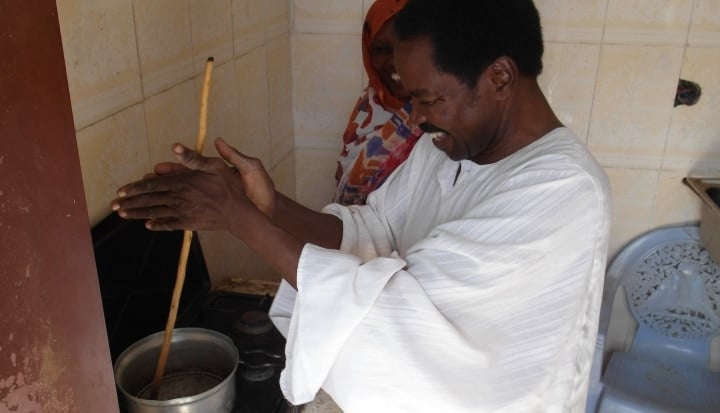Feeding your family and keeping warm are basic human needs. But in North Darfur, indoor pollution created by smoke from the firewood and charcoal used on household stoves is a major cause of death for women and children.
90% of households rely on wood and charcoal for their fuel. It’s expensive to buy and produces large amounts of smoke when burnt.
The reliance on firewood has led to mass deforestation in the area. Women traditionally do most of the cooking and spend long hours surrounded by smoke which causes eye and chest infections, coughs and other illnesses they then need to pay a doctor to treat. The stoves don’t cook efficiently, meaning it takes a long time to prepare meals so women are not able to work or spend time with their family.
To help combat this, Practical Action teamed up with the Women’s Development Association to educate communities and introduce new Liquid Petroleum Gas (LPG) stoves in El Fasher. Reducing carbon emissions and giving thousands of families clean homes, clean lungs and more money to spend on essentials.
The first project to be developed in a conflict zone, it demonstrates real environmental and social benefits and it recently won the best low-carbon project for improved cooking stoves in Sudan by the magazine Environmental Finance.
Community awareness programmes have made people aware of the dangers of using the wood stoves, and the harm it does to both their health and the environment. 12,080 stoves have been installed in households in El Fadir, with micro loans offered to poorer families to help cover the initial costs. Since the installation, almost 100% of households have said the air quality in their home has drastically improved. The new stoves use less fuel, saving around 65% on monthly fuel bills and the stoves cook quicker so women have more time to earn money and be with their families.
Deforestation has slowed and new community forests have been planted and the project has now become the first accredited carbon credit project in Sudan, with LPG stoves cutting more than 400,000 tonnes of Carbon Dioxide over ten years.
Individual case study: Aesha Hassan
Aesha Hassan is a housewife in her late thirties. She says that before the project arrived in her community black clouds of smoke would rise from the city every morning due to the amount of people using wood and charcoal to cook and heat their homes. The smoke residue would cling to the trees, damaging their growth.
Aesha said: “I had to wake up very early to prepare tea for my children before they went to school. My early mornings were like a nightmare because of the efforts I had to go to, to light a fire. It would take so long to get hot and then would fill the house with smelly, dirty smoke that stained the walls. Now things are totally different. It takes me very little time to prepare their tea, then we sit all together, drinking and laughing before they go to their schools .”
She continued: “Even my husband started to go on his own inside the kitchen to prepare his cup of tea or coffee without asking anyone else to do it for him.
“Before, he used to keep far away from the kitchen when we were using wood and charcoal, but now he is proud of the kitchen.”
Since this project has been introduced, there has been significant behaviour change amongst the men in the community. Where work in the kitchen used to fall solely to women and it would take hours to cook a simple meal, now they have clean, safe homes, families are healthier and they have more time to spend on other activities. Aesha says that the thick black clouds that rose above the city are a thing of the past – now you can see the green mountains surrounding El Fasher and the trees are starting to recover.










